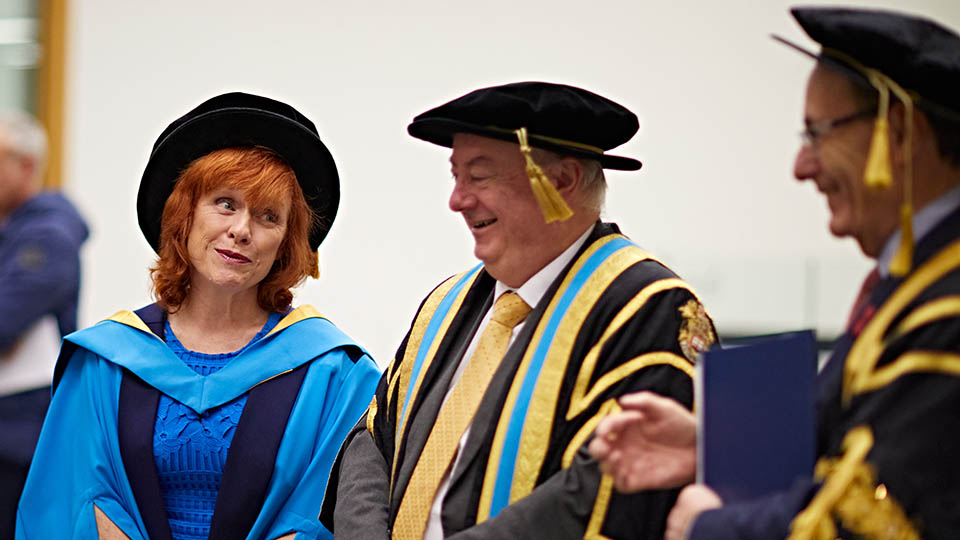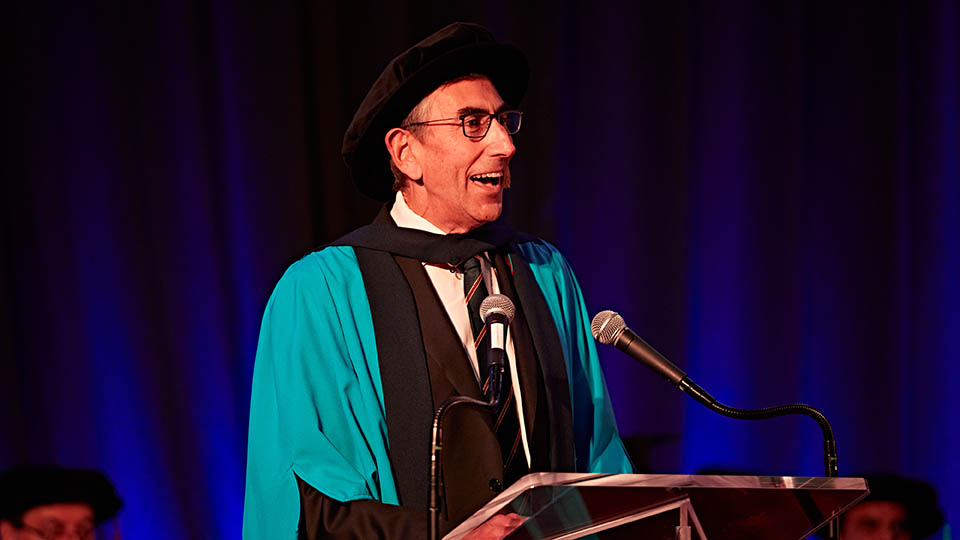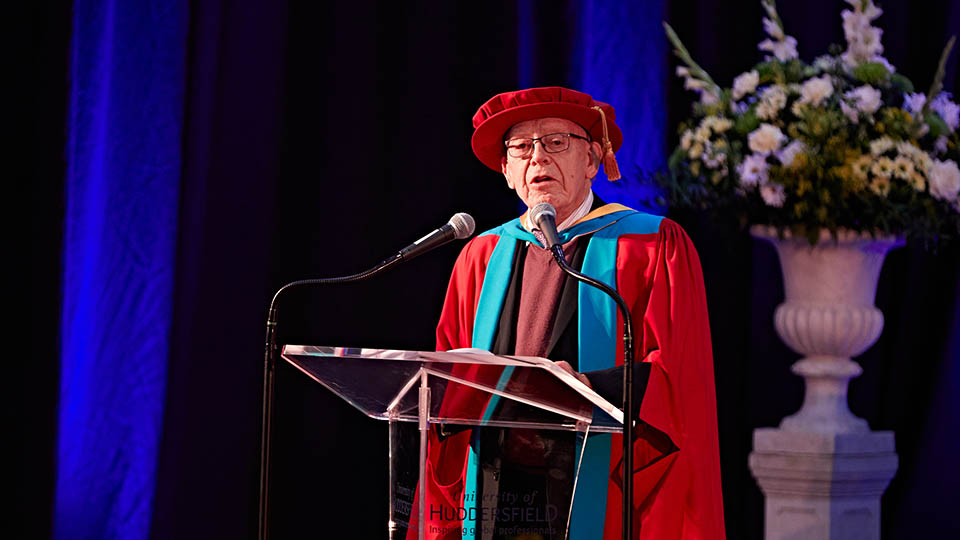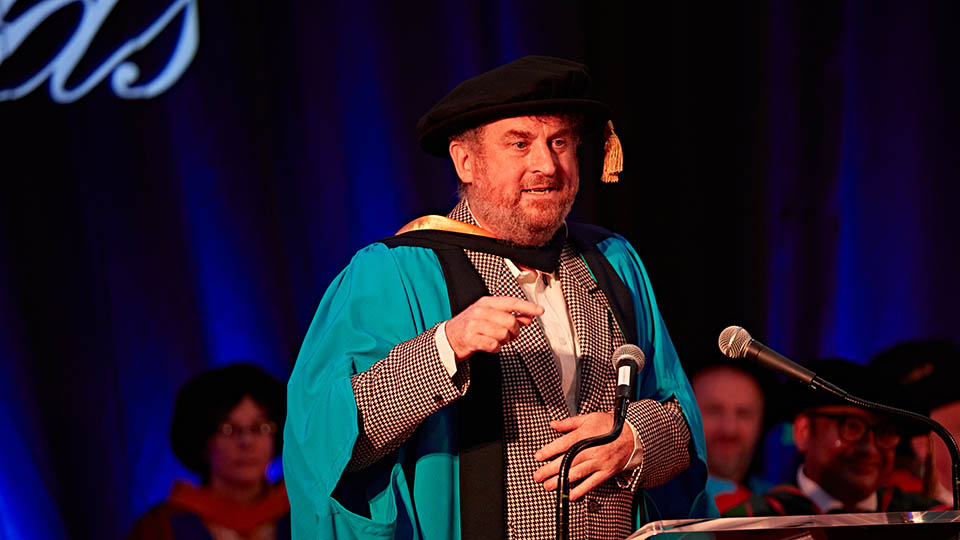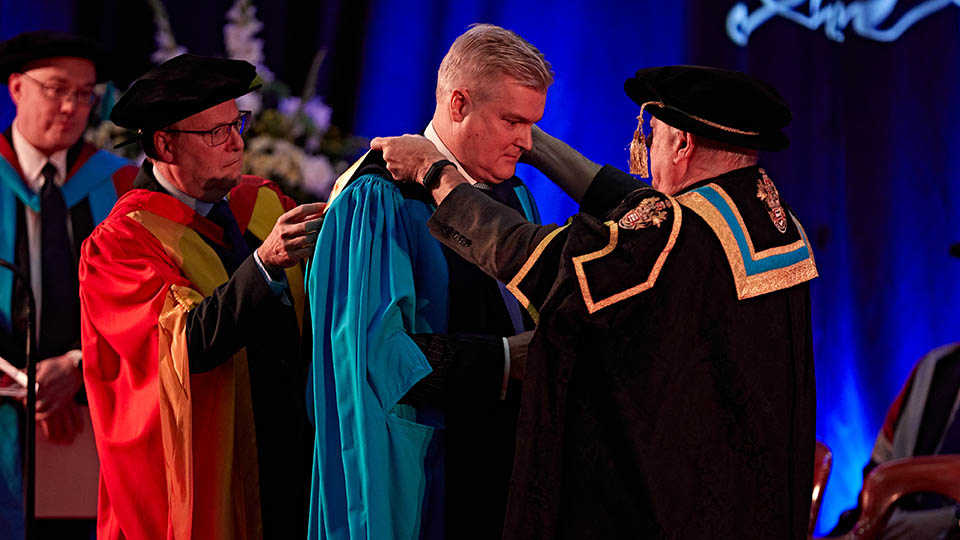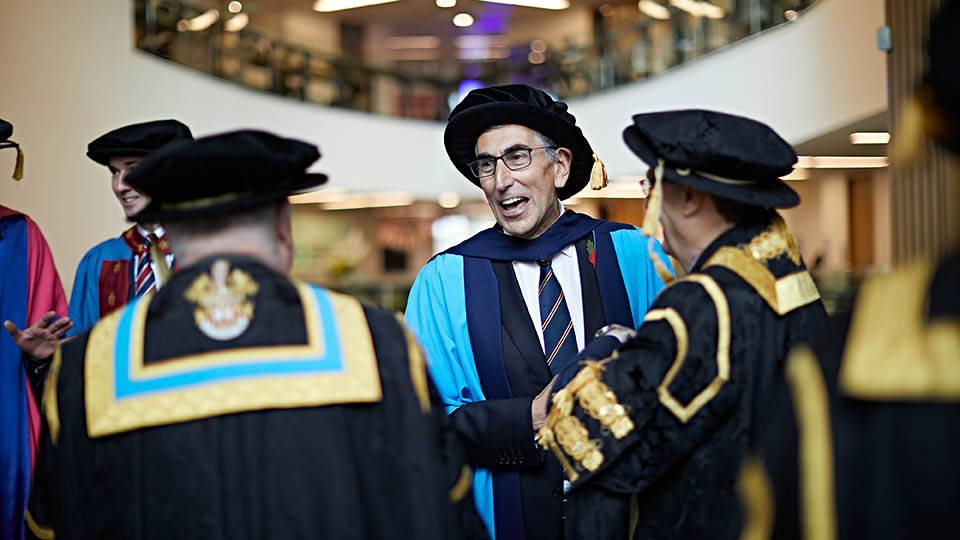Dr Sarah Jarvis MBE
GP and renowned healthcare expert
Sarah is a familiar face and voice across the media as well as Visiting Professor of General Practice at the University of Huddersfield.
Dr Sarah Jarvis is a well-known face and voice on medical matters, regularly contributing to discussions on health on BBC Radio 2, Channel 5, LBC and more.
Sarah's books include A Younger Woman’s Diagnose-it-yourself Guide, Women’s Health for Life, Pregnancy for Dummies, Children’s Health for Dummies and The Welcome Visitor, a book on the ethics of dying co-authored with John Humphrys. She founded the Women’s Taskforce at the Royal College of General Practitioners (RCGP) and was the RCGP Women’s Health spokesperson for over 15 years.
She is Visiting Professor in General Practice at the University of Huddersfield, and is patron of the University’s Institute of Skin Integrity and Infection Prevention (ISIaIP).
“To receive this honorary doctorate feels particularly exciting, but especially because I have worked so closely with Professor Karen Ousey at the ISIaIP,” says Dr Jarvis. “She is such an inspiration, I have heard so much about the University of Huddersfield and its work so I feel very privileged and very honoured.
“I don’t think anyone today can fail to understand how important infection prevention is. We had the most extraordinarily steep learning curve on how Covid was transmitted, and it fundamentally changed the advice I was being given and giving as a doctor. If we didn’t have this institute and others like it we would be much, much slower to understand emerging diseases. There has never been a time when the role of the institute has been more important.
Interview with medical broadcaster and television GP Dr Sarah Jarvis MBE
Dr Sarah Jarvis reflects on her honorary doctorate and assesses the world that our 2022 graduates are moving into.
Regarding the National Health Innovation Campus which will become an integral part of the University in the next few years, she added, “We are in a position where we have never needed innovation more in the NHS. Science has moved on dramatically, but new developments mean that we have to think differently. We have to think innovatively on how we can help people to help themselves, as sadly there are far more lifestyle challenges today than there were when I became a GP 32 years ago.
“Obesity is presenting huge challenges. We need to help people to help themselves, because as well as alcohol, drugs and tobacco, food can be really addictive too.”
And advising our recent graduates, she said, “I say follow your dreams but be aware that your dreams might change. I wanted to be a GP from the age of eight, I have never regretted going into general practice – it is an extraordinary profession, but it is not at all what I expected it to be.
“If you are graduating from any discipline, but particularly in healthcare, be very proud about what you are doing. You’ll change lives, you’ll save lives and you will make a huge difference.”
Nigel Fine
Former Chief Executive of the Institution of Engineering and Technology
Nigel is passionate about helping young people from all backgrounds getting the chance to make their way into engineering careers.
After graduating from UMIST in 1978 with a Civil Engineering degree, Nigel began his career with John Laing Construction where he worked as an engineer on major construction projects in the UK and the Middle East. Nigel is a registered professional engineer (C.Eng) and has a MBA from London Business School. He held Executive Director roles with International Paint, Andersen Consulting (Accenture) and Experian plc. In 2009 he was appointed Chief Executive of the Institution of Engineering and Technology (IET), before retiring in June 2022.
“We cannot get enough engineering graduates,” says Nigel. “The world is technology-enabled, everything we do has technology at the heart of it. We have a shortage of skills in this country and in developing counties, so the more young people going into engineering, the better. There has never been a better time to be one, and engineers are helping to make a better world.
“We need to make sure the opportunities are open to everybody and make it more inclusive for a more balanced society.”
Interview with civil engineer Nigel Fine
Nigel Fine reveals how he became inspired from a young age to go into civil engineering and says the skills possessed by today's engineering graduates are sought after and in great demand.
Advising today’s graduates, he says that people skills are vital to complement technical skills.
“You should not expect to have all your career plans mapped out. Careers are like marathons rather than sprints so pace yourself and be open to new opportunities whenever they come your way.
“As engineers and technologists, we are all taught to be creative, innovative, analytical, problem solvers and good team workers. These are all relevant skills that can be applied throughout your careers.
“There are some simple lessons from my career experiences. There is no substitute for hard work, seize opportunities for development and learning, and develop good collaborative working and people skills. Show kindness and empathy. Your new skills are in great demand all over the world, you have an amazing opportunity to engineer a better world.”
Richard Ayres
Acclaimed composer and music teacher
After graduating with Distinction in composition, electronic music and trombone from Huddersfield Polytechnic in 1989, Richard has lived and worked in The Netherlands.
Born in Cornwall in 1965, Richard played trombone in the local brass band, and was encouraged to compose by the trombonist and composer James Fulkerson. After briefly studying theatre, he studied composition at what was then the Huddersfield Polytechnic. After graduating, he moved to The Hague for postgraduate study in composition with Louis Andriessen at the Royal Conservatoire.
Richard still lives in the Netherlands, and in addition to his work as a freelance composer he also enjoys teaching at the Amsterdam Conservatoire, and is a guest teacher at the Royal Conservatoire in Birmingham. His hobbies include composing music, recording sounds and trying to fix an old sailing boat.
“It really opened my eyes at Huddersfield in the 1980s, because I met people that were like me, people who were interested in music and arts that I just did not meet before. They were experts in their field. There was the Huddersfield Contemporary Music Festival as well, so I met all these amazing musicians and composers which was extraordinary.
“It was one of the first places to have an electronic music studio, which was fantastic. It was at the cutting edge of music and recording.”
His advice to his fellow Huddersfield graduates is to enjoy the moment.
“Enjoy the journey, don’t worry about where it is going. If you enjoy a subject, you will never be lost. There is no such thing as ‘getting there’. I have been sat in opera houses, listened to my compositions being played but I still think that I have to get up in the morning and that this is not the end of it. There is always the next day.”
Interview with Huddersfield graduate and award-winning composer Richard Ayres
Here, Richard talks about how, after growing up in Cornwall, being a student at the University really opened his eyes to the world of music where he was surrounding by experts in their field and other students who enjoyed the same things he did. He urges music students who are about to graduate to enjoy the journey and try not to dwell too much on where that journey is going to end.
Professor Paul Needham PhD CEng FIET
Head of Engineering for Air and Space Products at BAE Systems
Professor Paul Needham achieved his degree and PhD at the University of Huddersfield. He is now Visiting Professor in the School of Computing and Engineering, and chair of the Industrial Advisory Board.
Paul is Head of Engineering for Air and Space Products at BAE Systems in Lancashire. He came into engineering via a vocational route, starting as an apprentice and studying part-time with the University of Huddersfield, continuing through to a PhD in Aerospace Design for Manufacture, which achieved an Innovation Award. His background has made him an inspiration to many engineers from non-traditional backgrounds, by demonstrating that engineering excellence is open to all.
He is a Visiting Professor in the School of Computing and Engineering at the University, where he chairs the industrial advisory board and is a PhD supervisor. He also has a number of academic publications in his field.
“It is a great honour, I am really proud because the University was a big part of my career, both through my academic learning and on the industrial side,” says Paul. “I have worked nationally and internationally, and this University has been a huge part of my development as an engineer.”
Interview with aerospace engineer Professor Paul Needham
Professor Paul Needham looks back to when he was a PhD student at the University and ahead which he says will be an exciting future for today's graduates.
He believes that these are exciting times for today’s engineering graduates.
“Engineering is transforming quicker than I have ever known it. The products we will develop tomorrow are far more complex than yesterday, so we need to grow and develop engineering in different ways as that’s what the customers want and expect. In the next 10 years, engineering will develop products that don’t even exist today.
“I honestly believe there has never been a better time to be an engineer. With the products we are going to develop, it is a great time.
“My advice is to work hard – put the hours in when needed. Keep learning – whether that is academically or industrial placement or professional accreditation. And it is important to know what you do not like more than what you do, as that will help you achieve. If you work hard and keep learning, you will find the areas you want to work in.”

